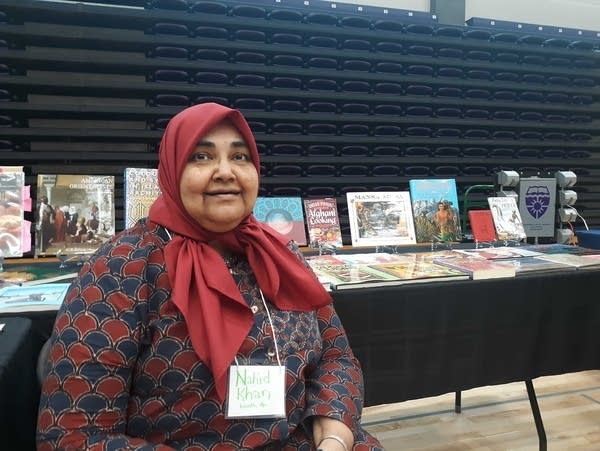Old books, new perspectives: Program aims to diversify rare books field

Go Deeper.
Create an account or log in to save stories.
Like this?
Thanks for liking this story! We have added it to a list of your favorite stories.
Jaime Harker is no stranger to the book business. She’s a professor of English at the University of Mississippi, and she’s published a few books herself. Her most recent book, “The Lesbian South,” dives into the history of queer and feminist publishing.
In 2017, she opened Violet Valley Bookstore, the only queer and feminist-focused bookstore in Mississippi.
But there’s one side of the book industry she could never quite crack: the rare and antiquarian book trade.
"It’s always been really interesting to me, and I couldn’t find a way in,” Harker said. “If you happened to fall into it, you got this network. But it was really impenetrable from the outside, and it has tended to seem pretty cliquey.”
Turn Up Your Support
MPR News helps you turn down the noise and build shared understanding. Turn up your support for this public resource and keep trusted journalism accessible to all.
The rare and antiquarian books market has historically been dominated by white men. Now, the industry is trying to change that.

The annual Antiquarian Book Seminar held at St. Olaf College started a new Diverse Voices Fellowship this year. The program brings five people from underrepresented communities — such as people of color, LGBTQ+ people, and women — to learn the trade at the week-long seminar at the college in Northfield, Minn. Harker is among this year’s fellows.
Rob Rulon-Miller, owner of Rulon-Miller Books and a faculty member and former director of the seminar, has been selling rare books since the 1960s. Especially when he started, he said, the industry was exclusive.
“It was not like it was a secret society… but to some degree it kind of was,” Rulon-Miller said. “Information was kept very close to the chest.”
Rulon-Miller got into the trade because his father was a book collector. Without some sort of connection, he said, it was hard to get a foot in the door.
The Diverse Voices Fellowship is among the new programs that are trying to change that. It’s part of a broader push for diversity and equity in the industry; the fellowship was modeled after similar ones at the University of Virginia’s Rare Books School.
Fellows started meeting virtually in the year before this summer’s seminar, and then took a trip to New York City to get acquainted with the trade.
Nahid Khan is another fellow in the program. She’s from the Twin Cities, and she’s been collecting Muslim American literature for decades. She plans to start an online store and pop-up sales after the seminar; those kinds of new business models, rather than traditional brick-and-mortar bookstores, are helping new sellers to get into the industry at a lower cost.
Khan started collecting after working as the manager of the bookstore and library at the Islamic Center of Minnesota in the 1990s. She said her interest in the bookselling industry has rekindled recently, as she’s seen the Muslim American community grow and publish more literature.
“Now it's 25 years later and there are more books, more beautiful cultural treasures, and more of an audience,” Khan said. “I see a great opportunity here to return to this area.”
Khan displayed part of her collection at the Minnesota Antiquarian Book Fair this summer, the week before the seminar. It offered a sampling of the last 100 or so years in Muslim American literature.
Older works on the table included what she described as a “gift book” published in Minneapolis in the 1930s called “Allah’s Prayer,” and a children’s book from the 1970s called “Shazira Shazam and the Devil” — neither of which are by Muslim writers or intended for Muslim readers, Khan said. They’re based on vague stereotypes of Islam and the Middle East, without any reference to real folk tales or specific places.
They remind her of books she read growing up.
“This is the kind of weird stuff that supposedly represented my general cultural background,” Khan said. “When we were young, we just didn't know what to make of that.”
She’s found better representation in more recent publications. She pointed out a locally published Somali-English bilingual children’s book — written by a Somali American author — as an example.
The reevaluation of who gets to be part of the industry is coming hand-in-hand with a reevaluation of the books themselves.
“People are now collecting really cool works of Black American authors, they’re looking at subgroups in pulp, queer print culture’s becoming a really interesting focus,” Harker said. “So as people recognize this is important and interesting, it becomes a new kind of market to create and preserve this stuff.”
Rulon-Miller said he’s also seeing more recognition of works that aren’t by white, Western men.
“Special collections librarians have largely been white, and they’ve collected based on what it is they know,” Rulon-Miller said. “They have very little in the way of material about underrepresented communities, but that’s changing.”
Khan said that she still sees places for improvement in the publishing and bookselling industries. Even though it’s easier than it used to be, she said it can still be difficult to find Muslim American literature that avoids stereotypes.
She said she hopes that preserving the books already out there will help further the progress she’s seen.
“I’d like to see people read and think, ‘I could write a book, too. I could illustrate a book, too. I could be creative and build up more of our culture.’ ”



